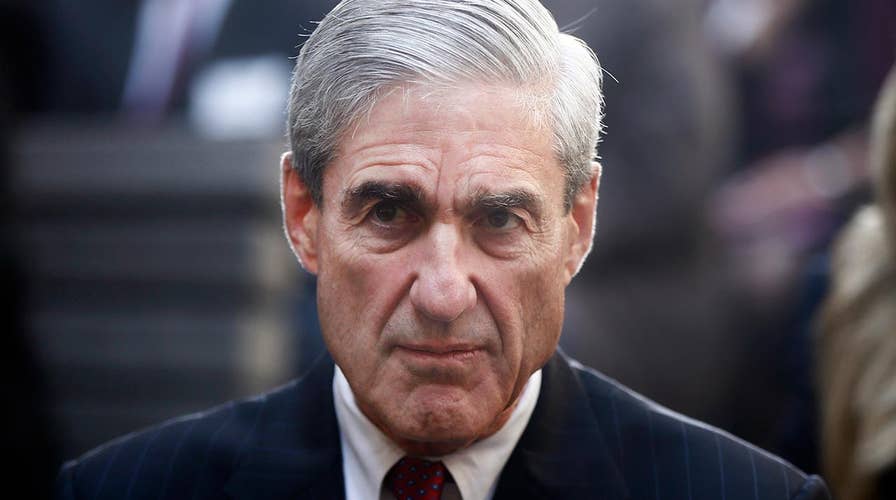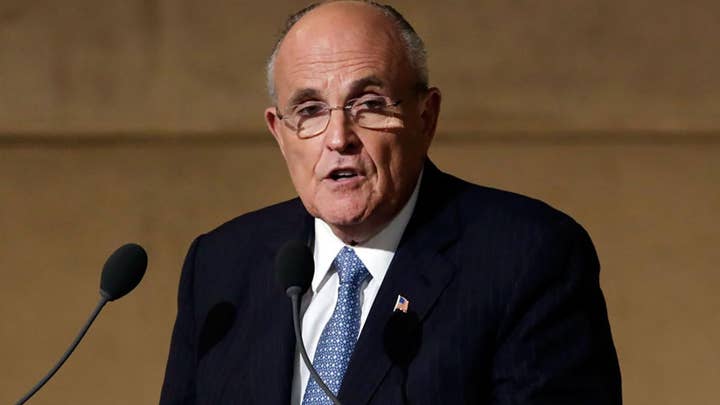Will the Mueller report deserve its own investigation?
Judicial Watch's Tom Fitton on why special counsel Robert Mueller's Russia probe will be a test for new Attorney General William Barr.
The most frequently used term surrounding the Russia investigation has often left many scratching their heads: collusion.
Merriam-Webster has seen spikes in searches for the definition of the word since Special Counsel Robert Mueller took over the probe to determine whether President Trump's 2016 presidential campaign conspired with Russian officials in May 2017. That same month, the online dictionary said “lookups” for collusion were up more than 1,800 percent.
Trump also has questioned what the term means.
3 THINGS YOU PROBABLY DON'T KNOW ABOUT ROBERT MUELLER
“Where’s the Collusion? They made up a phony crime called Collusion, and when there was no Collusion they say there was Obstruction (of a phony crime that never existed),” Trump tweeted at the time. “If you FIGHT BACK or say anything bad about the Rigged Witch Hunt, they scream Obstruction!”
The major takeaway from Attorney General William Barr's 448-page “limited” redacted Russia probe report in the spring was that there was no evidence of collusion between the Trump campaign and Russia. However, the report also noted that while it didn’t conclude Trump committed a crime, it doesn’t formally “exonerate” him.
As Mueller prepares to testify about his years-long investigation on July 24, here’s a look at what the buzzword means — and how it applies to this specific case.
What is collusion?
Collusion is a non-legal term that refers to secret collaboration or conspiracy. But in U.S. code, it’s only used in antitrust laws to address crimes like price fixing.
Other than that, the word isn’t necessarily equivalent to criminality, despite its frequent use, according to Politico.
"It's not a technical word. It's actually used, in part, to actually almost confuse people."
Michael Gerhardt, a constitutional law professor at the University of North Carolina, acknowledged the term can be confusing, especially when it’s linked to such a high-profile case.
"It's not a technical word. It's actually used, in part, to actually almost confuse people," Gerhardt previously told ABC News. "It's either used in two different ways: to almost confuse people, because there's no federal statute or code that uses this word, and then I think the other way it's used is maybe as a catch-all, an umbrella-like term that could encompass everything."
Is collusion a crime?
Even though “collusion” may not be a crime in and of itself, conspiracy is.
Conspiracy happens when two or more people agree to commit a crime “against the United States or to defraud the United States” and start to take steps toward it, according to 18 U.S. Code 371. People can still be charged with conspiracy, even if they don’t actually commit a crime, as long as there is proof they intended to carry out the illegal activity.
The statute specifically states conspiracy relates to "impairing, obstructing or defeating the lawful function of any department of government."
WHAT IS THE MUELLER REPORT? EVERYTHING YOU NEED TO KNOW ABOUT THE RUSSIA INVESTIGATION
"Because conspiracy charges carry separate penalties, you can be convicted of both conspiracy and a crime that you or your fellow conspirators accomplished during the conspiracy (the 'substantive' count)," the American Bar Association explains in a chapter on Criminal Justice.
“I have been sitting here looking in the federal code trying to find collusion as a crime...Collusion is not a crime," Trump's lawyer, Rudy Giuliani, previously told Fox News.
“I have been sitting here looking in the federal code trying to find collusion as a crime...Collusion is not a crime."
Giuliani later clarified his comment that "collusion is no crime," noting that the only actual crime in the Mueller investigation centers around hacking.
"And it's ridiculous to think that the president hacked," he told Fox News. "It has become crystal clear that this investigation ... has been continued as an illegitimate investigation."
How does it relate to Mueller’s probe?
Mueller has accused three Russian entities and 13 Russian nationals of allegedly hacking Democrats, including the Democratic National Committee (DNC) and Hillary Clinton's campaign during the 2016 election. Several of Trump's former campaign associates have also been charged as a result of the probe, though none of the charges are directly related to any misconduct by the president's campaign.
The term "collusion" may be shorthand, but if the special counsel uncovered any illegal activities between the U.S. and Russia — such as hacking, election fraud, falsifying records or conspiracy — during the 2016 election, then it would be considered a federal crime. However, Mueller ultimately found no evidence of collusion between the Trump campaign and Russia.
Mueller was initially considering whether Trump's attempts to close the investigation when it was first launched would be considered obstruction of justice, according to June 2017 reports. Several intelligence officials underwent interviews in front of the special counsel to discuss the matter. But Mueller also did not come to a conclusion on allegations of obstruction on behalf of Trump.
Section 1503 of Chapter 73 of U.S. Code Title 18 states: "A person who 'corruptly or by threats of force, or by threatening letter or communication, influences, obstructs, or impedes, or endeavors to influence, obstruct, or impede, the due administration of justice' is guilty of the crime of obstruction of justice."
Fox News’ Kaitlyn Schallhorn and The Associated Press contributed to this report.






















